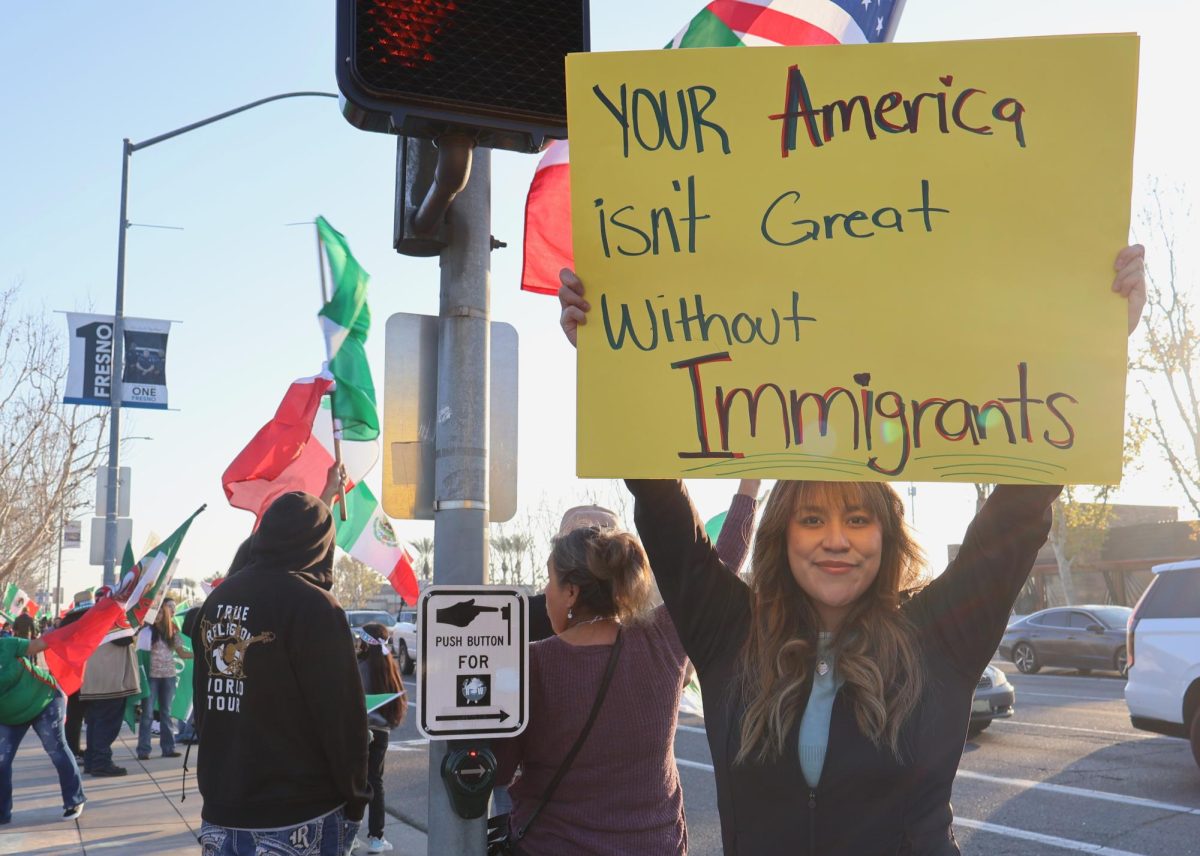For Vianey Beas, a 20-year-old Fresno native and a child of immigrant parents, the current immigration situation is forcing her to be the main provider of her household, since her parents are not stably working due to fear of U.S. Immigration and Customs Enforcement (ICE) raids.
“But now, because of the whole entire ICE raids, they’re scared to go to work,” Beas said. “They’re scared to even apply to jobs where they could get accepted, and now our daily life is just me going to work, them having nothing to do and staying at home.”
Thirty-seven days after taking over the presidency, Donald Trump’s executive orders are still causing rippling effects throughout the nation.
The Protecting the American People Against Invasion executive order, a combination of 23 sections and subsections, went into effect on Jan. 20, commencing the start of mass deportations and higher ICE sightings. The White House’s social media accounts have also released posts mocking the situation with “ASMR” videos and Valentine’s Day rhymes.
In Texas, an 11-year-old girl took her own life after experiencing bullying in school about her family’s immigration status.
The immigration tensions are leaving families and children afraid to be present in their community. Not even legal citizenship is enough to keep some at ease.
“I know that they can’t do anything to me since I was born here, but I am scared by just speaking Spanish,” Beas said. “If you heard about the news, just by speaking Spanish out in public, you [are] already a target, or just by being with my parents at the store, we’re already a target.”
Given the situation, all the financial burden falls on Beas’ shoulders.
“I’m working as a medical assistant, which is mostly how I pay for everything,” Beas said. “I pay for the phone bill, for the light bill, half of the rent. My dad does the other half. My sister always helps us as well…But I know for a fact that we’re mostly still here because I’m putting in more right now.”
She’s had to go as far as to part with some of her personal belongings just to be able to afford bills.
“I had to sell some of the clothing that I bought from concerts or from merch that they [artists] release,” Beas said. “I also had to sell some of the jewelry that I bought. And obviously those are just, like, materialistic. I would rather have those missing and have that money in hand to help them, because that’s just stuff that I could buy again.”
Her dad is from Guadalajara, Jalisco and her mom is from Córdoba, Veracruz. They made the journey to the United States in their late 20s.
Beas’ mother crossed the border illegally, traveling multiple days’ distance on foot. It was an experience that almost cost her her life.
“Both of them told me their stories, how they crossed, how many days they were there,” Beas said. “My mom was so close to dying.”
Chasing a dream through labor
It’s well known that most people who immigrate to the United States do so for the highly sought after “American Dream.”
In Beas’ parents’ case, they’ve worked in the fields every day without a single day off for most of her life in order to provide her and her sister with more fruitful opportunities than they had.
She recalls her dad coming home with blisters from the harsh labor.
“I even remember one time my dad coming home with blood on his hands, his nails were falling off because of the hard work that they would do in the fields,” Beas said. “I remember my dad’s hands would be like, very numb and very swollen. His feet were also swollen. He would get tired easily.”
However, as hardworking and dedicated as they are, the ongoing ICE raids are leaving her parents in fear, forcing them to stay home.
Her dad occasionally finds work to financially contribute what he can, but her mom is permanently at home, at least for the time being.
“I’ve been very stressed, trying to make ends meet to have the budget in order for me to be paying everything that I have to pay,” Beas said.
The raids began with the largest one happening in Kern County in Bakersfield with approximately 78 people detained in “Operation Return to Sender,” according to Cal Matters.
Immigration enforcement disturbing education
Immigration is not only a challenge post-education, but also both in K-12 and higher education with effects that are potentially detrimental to student learning.
Andy Levine, Fresno Unified Board of Trustees Area 5 representative, says attendance rates have dropped, especially during the “A Day Without Immigrants” protest that took place on Feb. 3.
“We saw a drop in attendance, but I think we’re concerned that we’ll see drops in attendance in general,” Levine said. “So not being in school obviously is going to impact learning.”
However, Fresno Unified has established clear immigration protocols that are strictly enforced.
“We can do everything we can to prepare to make sure our students’ families know that we will never support or cooperate with ICE,” Levine said. “ICE is not able to come on campus, unless they have a judicial warrant.”
Fresno State has also established its own immigration protocol.
President Saúl Jiménez-Sandoval has issued two email statements since December, with resources for undocumented students as well as those from immigrant families and information from the California State University (CSU) system.
If a student is approached by an immigration official, they are instructed to refer the official to Dean of Students Terree Stevenson or Fresno State Police Department Lt. Ruben Madrigal.
“It is important to inform the enforcement official that you are not obstructing their process but need to consult with the appropriate campus designees,” Jiménez-Sandoval said.
In the email he announced that Fresno State launched an updated Resources for Undocumented Students website.
The website states that the CSU system will not release any immigration or personal information to anyone unless a warrant, subpoena or court order is presented.
“Free immigration legal services are available for CSU students, employees, their families, alumni, and newly admitted students,” Jiménez-Sandoval wrote in the email on Dec. 17.
The university also has the Dream Success Center, whose mission is to provide support for “AB540, undocumented, DACA recipients and those with mixed immigration statuses,” according to its website.
The Immigrant Legal Resource Center (ILRC) offers a ‘Know Your Rights Red Card’ that details what to do if an individual is approached by any sort of immigration law enforcement.
The card is available to download on its website, or in person on campus in the Resnick Student Union Welcome Center, the Fresno State Library, the Latinx Affinity Room in the Cross-Cultural and Gender Center and at the Dream Success Center.
The reality of being a DACA recipient
Mauricio Gonzalez Cayetano, a Media, Communications and Journalism student at Fresno State, is 23 years old and has been in the United States since he was 2 years old. He immigrated from Mexico City and was kept unaware of his situation as a child.
“They kind of sugar coat it because what’s a little two year old really going to understand about what he can and can’t do in the United States,” Gonzalez Cayetano said.
He completed his entire K-12 academic career in Fresno Unified and didn’t face any documentation challenges until he was applying for college when he had to sign up for the Deferred Action for Childhood Arrivals act (DACA).
DACA is a United States immigration policy that grants children permission to reside in the country for a specialized amount of time providing them with a social security number.
“It didn’t really feel different until senior year, when I started applying for school and colleges, because I remember after my mom signed me up for DACA,” Gonzalez Cayetano said. “It was junior year of high school, I still wasn’t really sure what it was.”
However, he says it was a very difficult process and he had to jump through many hoops just to apply. He was asked for proof of residence in the country of at least 15 years, if not, he’d be considered an international student.
He expressed his frustrations explaining that having been here for 21 years practically makes him a Fresno native.
“I literally have history of going to school here my whole life,” Gonzalez Cayetano said. “I[‘ve] pretty much been here my whole life. What do you mean you don’t count me as a real native?”
In high school, Gonzalez Cayetano was an Advancement Via Individual Determination (AVID) student, which provides opportunities for professional development and preparation in school.
While he says he’s grateful for the experience, he also has occasionally felt that it was useless because a lot of what he was taught, he can’t apply in his life.
“It kind of sucked, because a lot of it that they pushed on me I just really couldn’t exercise it, whether it was applying for a scholarship,” Gonzalez Cayetano said. “I couldn’t get it, because the first thing they asked me if I’m a natural born citizen, it sucks, because I’m just like, damn, I really can’t apply for extra money to go to school just because I wasn’t born here.”
At times these challenges made Gonzalez Cayetano want to give up, but nonetheless he persisted. He says a big factor in his motivation was his mother.
“Realistically, without her, I probably wouldn’t have been here this far,” Gonzalez Cayetano said. “She always makes me believe that I can do it again, because she knows I can.”
Education isn’t always a solution
For some, even education can’t provide a clear way forward.
Fernando Camarillo has a bachelor’s degree in Media, Communications and Journalism from Fresno State, but cannot use it.
“I’ve talked to [news] stations and they’re more than willing to be like ‘oh you should definitely sign up, we’d love to have you’ but then once it gets to the point where I’m asked to like actually talk to HR or something like that, there’s no getting around not having a social security number or even just a birth certificate,” Camarillo said.
Due to an incident when he was only a baby, he has no proof of birth or citizenship. His unique situation is called being “stateless” because as an individual he is unable to claim citizenship of any place in the world.
He attended a four-year university, studied, did countless hours of homework and graduated, but can’t get a job anywhere, because he doesn’t have any documents to prove his identity.
“There’s nothing that proves that I am who I say I am,” Camarillo said. “And even my name would not be my name, because that was given to me when I got here.”
Camarillo has been in touch with legal representatives in order to be proactive about his situation.
“I got the little card so I mean it would pretty much just be me, just not saying anything, and just like for the best, because even if I am detained to get to that point, it’s just making sure that I won’t talk unless I have someone, like a legal advisor, present,” Camarillo said.
However, the ongoing of immigration raids still leave Camarillo with feelings of uneasiness.
“It just sucks that no one really knows for sure what’s going to be happening because I think a lot of it is just like, they [other immigrants] have no idea if they should go to work or what they should do,” Camarillo said.
He is currently working with a legal team to obtain either his real birth certificate or create an entirely new one, to get set up for his future career.
“I love journalism as a whole, and so I’d love to continue with anything, whether it be broadcast or digital,” Camarillo said.
The surge in protests
For weeks, people across the United States have taken to the streets to protest and fight for their rights.
Fresno has seen protests every weekend since Inauguration Day, with several residents also participating in “A Day Without Immigrants.”
In Downtown Los Angeles, thousands of protestors invaded Highway 101 and completely shut it down for several hours.
On Feb. 7 hundreds of Fresno Unified high school students walked out of classes in a demonstration against ICE.
Beas says she participates in the protests in the way that she was raised; by putting up a united family front.
“I’m just in awe of how people can come together and fight for what’s right, and fight for their rights, and fight for their parent’s rights, their sibling’s rights, their grandparent’s rights,” Beas said.
Other protesters call on government officials, pleading for support in immigration reform.
“To the senators and to the president today, we need you to understand us,” said Leonel Flores in Spanish at a Fresno protest on Jan. 20. “We need a permit, we need a residency, we need a path to citizenship. We don’t want deportations. We don’t want separation of families. So please help us.”
Gonzalez Cayetano isn’t surprised by the current immigration status in the country.
“I know it’s such a huge thing, and it affects so many people, but it’s not that I don’t care, but I feel kind of numb to it now, it’s kind of like sh*t, here we go, type of thing,” Gonzalez Cayetano said.
Camarillo says he admires the people protesting because of the amount of support they are rallying.
“I think it’s really cool to just see that their voices are being heard,” Camarillo said. “I’ve only seen support for it, and so that’s really cool to see. And I think it only helps and shows people in power that people are against those laws that would push them down.”
Living in terror
Along with fear in the workforce and education, there is also fear in the community and being in public.
Gonzalez Cayetano says immigration has been a problem for as long as he can recall.
“I remember a few times as a kid, my mom told me we’re not going to go out today because, you know, immigration is over there, or when you get off of school, go straight home because immigration is around in town,” he said.
For Beas, her biggest fear and uncertainty ultimately lay in not knowing whether or not she’ll reunite with her parents at the end of each day.
“I’m personally scared that I might come home one day and not see my parents, or I might just be driving home and then I see other people getting pulled over by immigration,” Beas said. “I am scared for my own safety and my parents and everybody else’s because it’s scary and terrifying to think about.”
The children of immigrant parents are suffering in terms of education, for fear of ICE, limited opportunities, fear of being separated from their families and struggling when it comes to entering the workforce after college.
But they recognize that all their parents’ sacrifices were done with their best interests at heart.
“Everything that they did was just to make me and my sister happy, to make us feel safe, to give us whatever we want, and they did achieve that,” Beas said. “And now, since I was their motivation, they’re my motivation to keep going.”
There have been approximately 10,000 deportations in the 37 days that Trump has been in office. That’s 10,000 people removed from the place they call home. The native countries that these individuals belong to are preparing for their return.
President Claudia Sheinbaum of Mexico is fostering the “Mexico Embraces You” plan to reassure its people that they have a home to return to.
Guatemala also has a similar plan in place called “Retorno Al Hogar” or “Return To Home” assuring its citizens that they will be supported upon arrival.
While Trump remains committed to the mass deportation of undocumented immigrants, countries like Mexico and Guatemala have commenced programs ready to welcome the return of their citizens with open arms.






